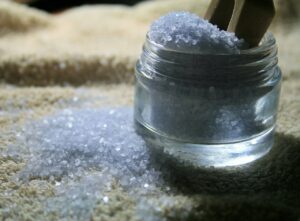 Everyone who is genetically predisposed to allergy may become allergic, in his lifetime, even if he or she is not aware of being predisposed…
Everyone who is genetically predisposed to allergy may become allergic, in his lifetime, even if he or she is not aware of being predisposed…
Allergic reaction arises depending on particular conditions of immunitary system, as well as on environmental factors.
For someone few contact with allergens are enough, others need a lot of exposures before getting a reaction; so, the latter may use for long time products containing the allergen, believing to be immune to allergy… but their reaction is just postponed.
Allergic symptoms range varies from the lightest (allergic rhinitis, little cutaneous problems), to asthma, to anaphylactic shock. Once the reaction have been, the patient will not be able to touch again the allergen, without getting a new reaction.
Theoretically, any chemical may cause allergic reactions; however some particular chemicals were identified as the strongest allergen by European Commission, through in-depth epidemiologic studies. See CE/15/2003 Directive to see the 26 Main Allergen List which must be specified on product label (if present respectively more than 0,01% in products to be rinsed off, more than 0,001% in leave-on products).
Specialists who treats allergies found that natural origin chemicals are more frequently involved in allergic reactions. However this issue is confirmed by the 26 Allergen List: most of them are basic components of essential oils. Such “oils” (but “oil” is not the real definition: their molecules are very little and volatile, chemically classified as solvents) are very popular because of their organoleptic properties, that is their “essences“ are very agreeable; moreover some of them seem to show therapeutic properties (bacteriostatic effects).
Such properties must not make users let their guard down: as well as allergenic properties, many essential oils show long-term toxicities – among them endocrine disruption – and most of them show the ability of hoarding (bioaccumulation) into adipose tissues and in breast milk. That’s mainly why it is strongly recommended to pregnant women and children under 3 years old to avoid exposure to essential oils.
The aim of Bensos’ Criteria is to be as much as possible impartial, so Bensos does not take the side on any chemical relative to another: Bensos’ choice is based on ecologic and toxicologic properties. Being “natural” does not mean being “safe”. Whatever is the origin of a chemical, if a substance shows long-term toxicity then Bensos decides not to use it, with the aim to protect both users and production workers.
All Bensos and Benè products does contain neither essential oils nor other allergens. Most products are perfume-free; some are perfumed with certified hypoallergenic and phtalate-free fragrances.



Leave a Reply